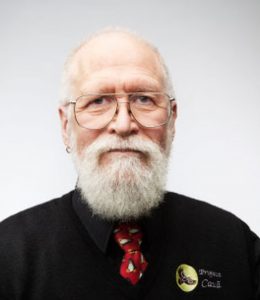Boa notícia: “Jon Maddog” Hall confirma presença no FISL18
 Uma presença já tradicional no FISL confirma a vinda ao Brasil novamente. Jon “Maddog” Hall ficou conhecido internacionalmente por ser Diretor do Conselho do Linux Professional Institute. Hoje, atua como CEO da OptDyn, criadora do software de nuvem p2p Subutai. Ele também trabalha como consultor independente para levar recursos computacionais ecologicamente corretos para mercados emergentes. Maddog iniciou sua carreira na computação em 1969, quase meio século atrás, e já atuou como programador, designer de sistemas, administrador de sistemas, gerente de produtos, gerente de marketing técnico, educador e consultor.
Uma presença já tradicional no FISL confirma a vinda ao Brasil novamente. Jon “Maddog” Hall ficou conhecido internacionalmente por ser Diretor do Conselho do Linux Professional Institute. Hoje, atua como CEO da OptDyn, criadora do software de nuvem p2p Subutai. Ele também trabalha como consultor independente para levar recursos computacionais ecologicamente corretos para mercados emergentes. Maddog iniciou sua carreira na computação em 1969, quase meio século atrás, e já atuou como programador, designer de sistemas, administrador de sistemas, gerente de produtos, gerente de marketing técnico, educador e consultor.
No FISL18, Maddog irá fazer três palestras. As datas e horários serão confirmadas nos próximos dias, mas já adiantamos os temas por aqui! Fique ligado na grade de programação do evento para ficar sabendo de todos os detalhes.
A primeira atividade terá como título “Open Source Peer-to-Peer Cloud Software – making, saving and mining money” e fala sobre sistemas P2P para cloud computing como uma forma de não ficar completamente dependente de grandes corporações, como Microsoft, Amazon, IBM e Google. Ele irá apresentar o software open source Sabutai, que além de proporcionar controle sobre as suas próprias informações também permite a venda de recursos computacionais que estejam sobrando na sua estrutura por tokens digitais.
Na segunda atividade, que terá como título “Open Education: Do I really need a university education in Computer Science and Engineering?”, Maddog irá discutir a real necessidade de uma formação acadêmica para aprender computação e formas de obter conhecimentos livremente.
E na terceira e última palestra, que terá como título “A Half-Century of Unix/A Quarter Century of GNU/Linux and why it matters”, o palestrante irá refletir sobre o que significam todos esses marcos temporais na história da programação e da internet e como diversos campos da sociedade estão lidando com eles.
Confira os resumos completos das palestras (em inglês):
Palestra dia 11 – provavelmente às 10h
Title: Subutai: Open Source Peer-to-Peer Cloud Software – making, saving and mining money
Abstract: Most of what people call “the cloud” today are businesses run by large corporations, typically headquartered in the United States, and under United States law. These large companies (Microsoft, Amazon, IBM, Google) only want to sell you resources. They are not interested in buying resources from you, only selling resources to you. Subutai offers you an Open Source, Peer-to-Peer Cloud platform “PeerOS”, which uses the same lightweight Linux Containers (LXC) as other cloud vendors to allow you to set up your own secure, safe cloud, giving you control over your data and processing. In addition Subutai allows you to earn “GoodWill”, lightweight digital tokens, by selling or renting your unused computing resources to other people. You can also exchange GoodWill for KHAN, an Ethereum-based token soon to reach ICO. Finally OptDyn contributed the Subutai Blockchain Router design to the Caninos Loucos project at LSITEC, a secure broadband router/NAS Server/IoT Gateway that also efficiently mines cryptocurrencies. This router will be manufactured in Brazil and be sold in large quantities as of Q3CY18.
Palestra do dia 12 – provavelmente às 12h
Title: Open Education: Do I really need a university education in Computer Science and Engineering?
Abstract: Many times I have been asked if people need a university degree to do computer science or computer engineering. The short answer is “no”, but the longer answer is “perhaps”. This talk will discuss several ways you can effectively teach yourself these skills and how you can prepare for a job in the computer field.
Palestra dia 14 -possivelmente 14h
Title: 2019: A Half-Century of Unix/A Quarter Century of GNU/Linux and why it matters
Abstract: Next year will be the fiftieth anniversary of Unix and the beginning of the Internet. Twenty five years later V1.0 of the Linux kernel shipped. Why were these (and other milestones) significant? Did the people who started these projects envision they would have the impact they did, or did they do it “just for fun”? What market needs were met by these systems? How close was the computer industry to M$-ageddon? Maddog will bring his unique perspective on these questions and more, as he recounts his half-century of programming, most of it with what we now call “Open Source”.